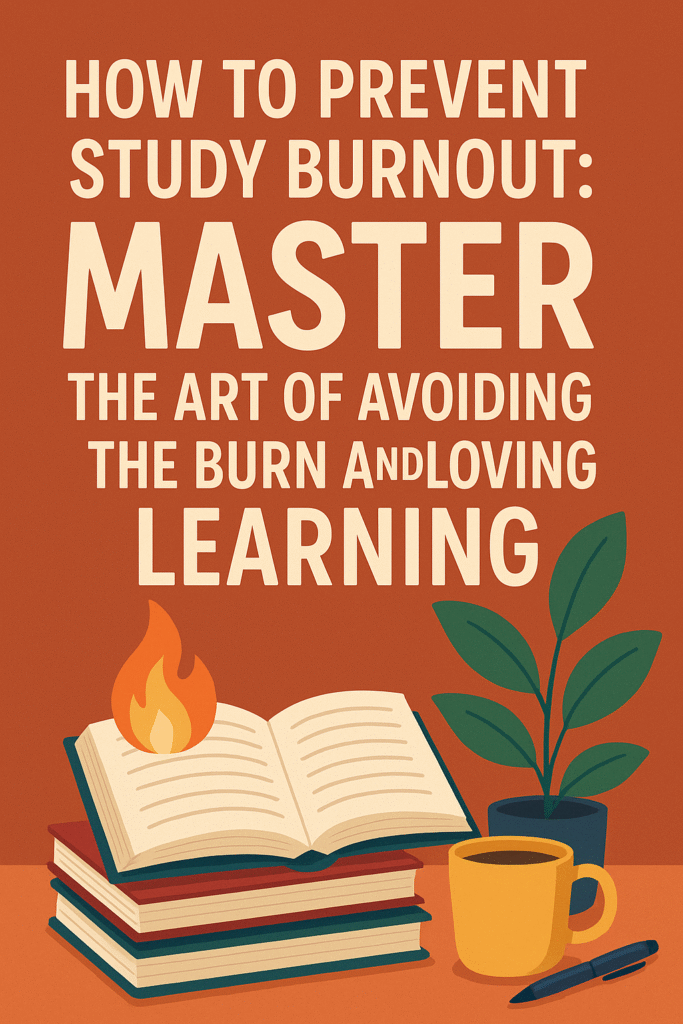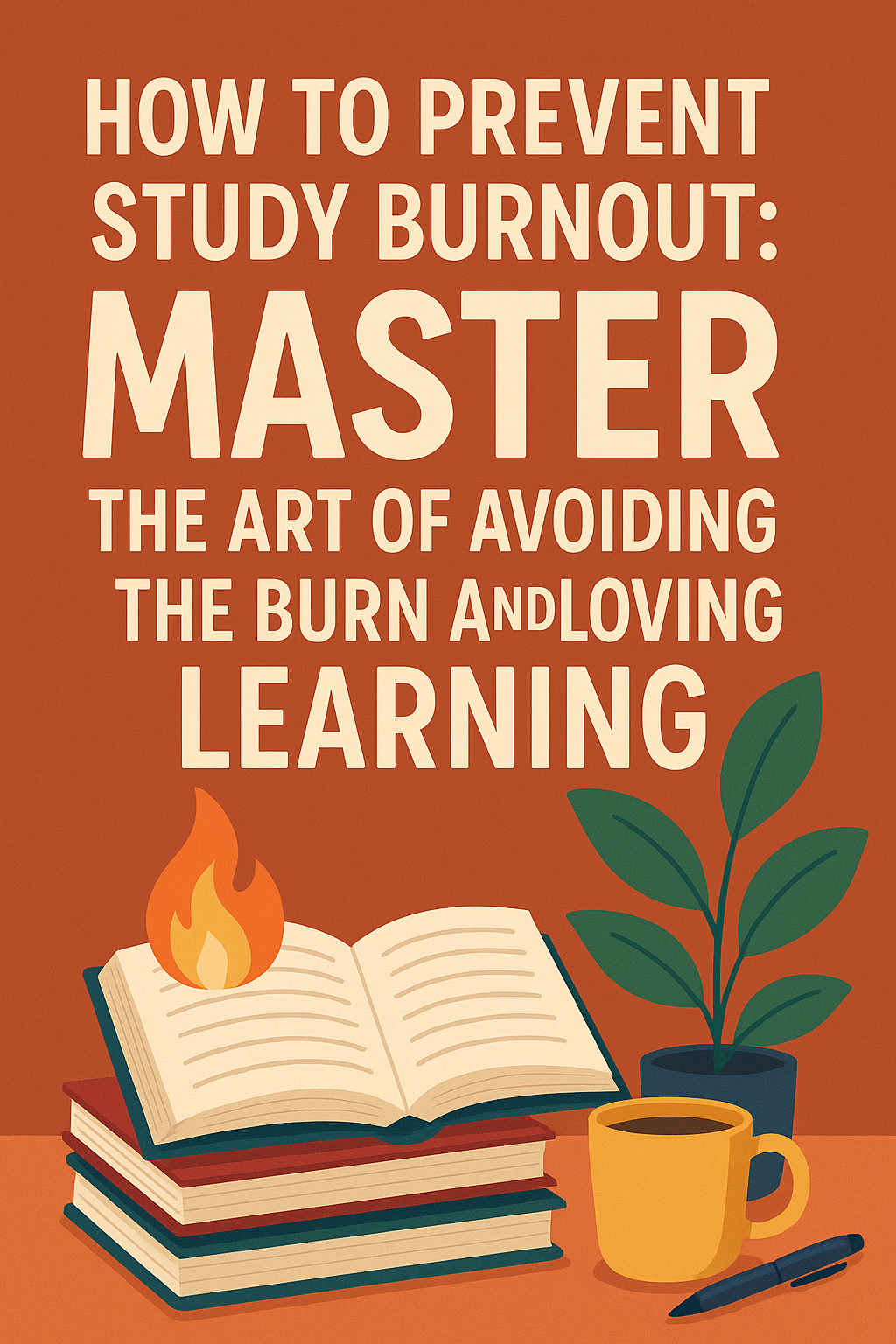HOW TO PREVENT STUDY BURNOUT: MASTER THE ART OF AVOIDING THE BURN AND LOVING LEARNING IN 2025
In the age of competitive studies, online distractions, and continuous demands to perform, numerous students are at risk of experiencing study burnout. Burnout is a condition of physical, mental, and emotional exhaustion created by intense stress and working too much. Although it might look like a mark of honor to study for many hours continuously without rest, it is mostly a self-defeating strategy in the long term. The secret of academic achievement does not depend on how much one studies, but rather on the ability to manage one’s mental well-being relative to learning styles.

WHAT IS STUDY BURNOUT?
Study burnout is an emotional state that occurs as a result of long-standing academic pressure. It happens when students overexert themselves for long periods of time, usually neglecting relaxation, recreation, and mental health.
Typical Signs of Study Burnout:
Incessant fatigue or weariness
Lack of interest or motivation in academic work
Poor academic performance
Difficulty concentrating or memorizing
Feeling anxious, depressed, or overwhelmed
Headaches or sleep disturbances
Burnout, if not dealt with, can cause mental illness like anxiety disorders or depression, and in extreme cases, even lead to dropout by students.
WHY DOES STUDY BURNOUT OCCUR?
To be able to prevent burnout, it is important to understand why it occurs. Some of the common reasons include:
1. Unrealistic Expectations
Most students set unrealistically high goals, expecting to achieve perfection on each exam, assignment, or competition. Ambition is commendable but perfectionism is highly stressful.
2. Inefficient Time Management
Study cramming, procrastination, or inadequate time for rest can cause mental overload.
3. Physical Inactivity
Long-hour study without physical activity results in reduced blood circulation to the brain, leading to drowsiness and dullness.
4. Social Isolation
Spending every waking moment with textbooks and without any social contact with friends or family can contribute to loneliness and emotional burnout.
5. Digital Distractions
The perpetual ping of notifications and the temptation of social media breaks concentration and decreases productivity, boosting the time and effort required for studying.
EFFECTS OF STUDY BURNOUT
Burnout is not just limited to your studies—it happens across all areas of your life. Burnout students can expect:
Decreased academic performance
Compromised immune system
Decreased interest in learning
Irritability or mood swings
Increased dependence on caffeine or stimulants
In extreme cases, burnout can result in mental breakdowns and long-term avoidance of learning. That’s why prevention early on is not only recommended—it’s necessary.
TIPS TO AVOID STUDY BURNOUT
Preventing burnout involves a holistic approach that reconciles academic achievement with personal well-being. Here are tried, tested strategies:
1. CREATE A REALISTIC STUDY SCHEDULE
A well-planned timetable can avoid last-minute desperation and develop discipline.
Divide study sessions into segments (e.g., 50 minutes of study, 10 minutes of break).
Establish realistic daily targets.
Schedule buffer time for unexpected delays.
The Pomodoro Technique, which consists of 25 minutes of intense study and a 5-minute break, is also an effective way to stay concentrated without getting tired.
2. PRIORITIZE SLEEP
Sleep deprivation not only impacts concentration but also disrupts memory consolidation.
Strive for 7–9 hours of good sleep each night.
Avoid screens and caffeine one hour before sleep.
Go to bed and wake up at the same time seven days a week.
Your brain processes learning during sleep, so all-nighters are actually harmful.
3. EXERCISE REGULARLY
Exercise enhances brain function, suppresses stress hormones, and boosts energy levels.
Take a 20–30 minute walk each day.
Practice yoga or stretching between study sessions.
Join a fitness class or team sport to add fun to exercise.
Even light exercise enhances blood flow and decreases mental exhaustion considerably.
4. EAT BRAIN-BOOSTING FOODS
Your brain requires fuel to perform optimally.
Add foods rich in omega-3 such as fish, walnuts, and flaxseeds.
Consume fruits, vegetables, and whole grains for sustained energy.
Drink water and limit sugar or junk food.
Don’t study on an empty stomach or use energy drinks—they cause crashes.
5. PRACTICE MINDFULNESS AND MEDITATION
Daily mindfulness exercises soothe the mind and enhance concentration.
Practice deep breathing for 5 minutes prior to beginning a study session.
Employ meditation apps such as Headspace or Calm.
Write down your thoughts to clear mental clutter.
Mindfulness lowers anxiety and keeps emotions in check, avoiding burnout.
6. TAKE BREAKS—WITHOUT GUILT
Short breaks refresh the mind and avoid mental overload.
Take a walk outside for fresh air.
Listen to music or read a book.
Get together with friends or family during leisure time.
Breaks aren’t time-wasters—they’re for cognitive recovery.
7. SET BOUNDARIES WITH TECHNOLOGY
Screen distractions can double your study time and lead to unnecessary stress.
Utilize apps such as Forest or Focus@Will to stay focused.
Silence notifications when studying.
Put your phone in another room when focusing.
Learn to manage your screen time before it manages you.
8. STAY CONNECTED SOCIALLY
Strong social support increases mental resilience.
Discuss concerns with friends regarding academic problems.
Participate in study groups to learn together.
Discuss concerns with a counselor or mentor if necessary.
You don’t need to endure stress by yourself—social interaction heals.
9. CELEBRATE SMALL WINS
Celebrating your successes keeps you going.
Reward yourself for achievement of study goals.
Maintain a progress tracker or achievement log.
Celebrate effort, not merely outcome.
This creates a positive linkage with learning, preventing burnout.
10. KNOW WHEN TO ASK FOR HELP
Burnout sometimes gets so bad that self-care isn’t possible.
Talk to a counselor or psychologist if symptoms don’t go away.
Don’t be afraid to ask for help with courses you struggle with in school.
Be truthful about being upset with teachers or parents about it.
Asking for help is a sign of strength, not weakness.
LONG-TERM STRATEGIES FOR A HEALTHY STUDY ROUTIN
When you recover from or avoid burnout, keeping to a sustainable rhythm is vital. Here’s how:
Learn, not grade.
Balance studying with hobbies and recreation.
Consider how you study and optimize what doesn’t work.
Develop a growth mindset—failure is a learning experience.
Mental health is not a privilege—it’s a requirement for achievement.
CONCLUSION: BALANCE IS THE SECRET TO BURNOUT-FREE STUDYING
Burnout is a very real and perilous threat for students in the fast-paced study world today. But prevention is possible with awareness, self-discipline, and proper care. By incorporating breaks, sleep, exercise, diet, and mindfulness into your daily study time ensures not only academic achievement, but a happy and rewarding study experience.
Your most precious possession is a healthy mind. Guard it, cultivate it, and it will sustain you through the toughest academic experiences with strength and endurance
Also Read:- TOP 10 STUDY HABITS THAT STUDENTS MUST EMBRACE TO IMPROVE MEMORY AND FOCUS

